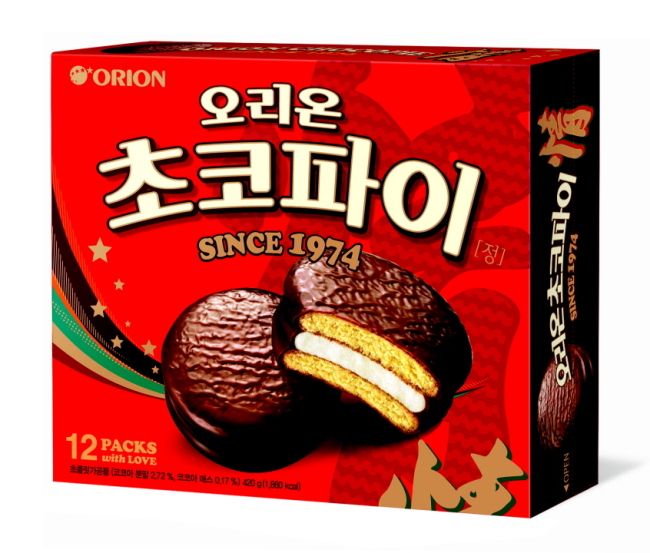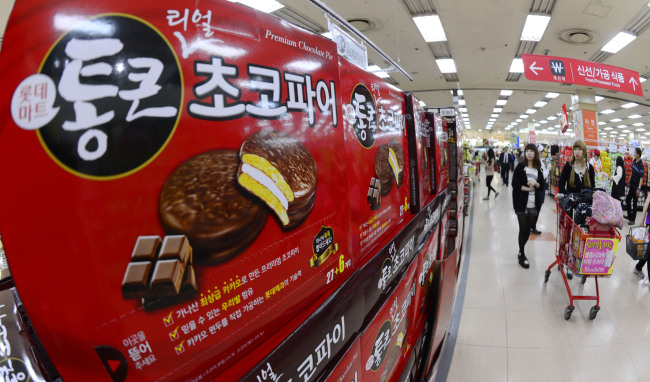그 동안 국내 유통의 거대 기업인 롯데마트와 신세계 이마트는 자사의 유리한 유통망을 이용해 경쟁사 제품보다 저렴한 PB 상품을 내놓아서 질타를 받아왔다.
롯데마트는, 경쟁사 오리온의 닥터유 에너지바보다 저렴한 가격인 500원에 통큰 에너지바를 내놓았으며, 농심 신라면을 겨냥한 롯데 라면, 삼양 큐원 브라우니 믹스를 겨냥한 초이스엘 브라우니 믹스를 출시했다.
이마트 또한 쌀, 우유, 화장지, 일회용 종이컵, 물 등 다양한 PB 상품을 내놓았다.
공급 업체들은 경쟁사보다 최대 50%까지 저렴한 유통사의 PB 상품에 당황스러워 하는 눈치이지만, 제품의 주된 판매 통로인 롯데마트와 이마트와 거래가 끊어질 것을 우려해 항의조차 못하고 있는 실정이다.
계속해서 이마트와 롯데마트가 저가의 PB 상품을 출시하게 되면 가장 큰 피해자는 이를 제조하는 중소기업이 된다.
원자재 가격 상승을 이유로 일반 식품업체들은 가격을 연평균 12%씩 상승 시킨 반면, PB 상품 제조 중소기업의 가격 인상폭은 1%도 채 안 된다.
저가를 유지하라는 압박이 계속 되는 한, 중소기업들은 대형 식품업체보다 더 나은 제품을 만들어 낼 수 없으며, 자체 브랜드 개발 보다는 계속해서 유통업체의 PB 제품을 만들 수 밖에 없다.
한편, 6년 전 2조원 안팎이었던 PB 상품 매출액은 계속되는 경제 불황을 틈타, 지난해 7조원을 넘어섰다. (코리아헤럴드 김소현 기자/ 번역 최인정 인턴기자)
<관련 영문 기사>
Food makers frown at Lotte’s copycat behavior
By Kim So-hyun
Choco Pie has been a legendary snack for nearly 40 years since Orion created it in 1974.
The two small, round chocolate-covered layers of cake packed with marshmallow filling melted the hearts of people around the world including North Koreans after they spread in the isolated country through the inter-Korean industrial park in Gaeseong.
Just four years after its launch, Orion Choco Pie met a copycat rival at home. Lotte Confectionery introduced the same snack with the same name in 1978.
Orion filed for a patent trial when Lotte registered the identically pronounced trademark using one different Korean vowel for the copycat product in 1979.
Orion lost, however, as the court acknowledged Lotte’s trademark rights.
In the 1980s, Orion filed for another lawsuit accusing Lotte of copying its package design, but the two eventually made up in court.
Years after Orion changed its package color from blue to red as red appealed more in China, Lotte followed suit in 2012.
Despite the constant copycat acts, Orion’s Choco Pie commanded over 80 percent of the domestic market with its uniquely soft and moist, chewy texture.
But the original is now facing fresh challenge as Lotte Mart earlier this month rolled out its own private label product “Tongkeun Choco Pie,” which contains more chocolate and is cheaper.
The nation’s second largest discount store chain said the “Tongkeun Choco Pie,” produced by affiliate Lotte Confectionery, is 18 percent cheaper than Orion’s and contains 20 percent more chocolate.
A 7,200-won box with the Lotte Mart label contains 33 choco pies, six more than Orion’s box of the same price.
In the six days after it hit stores on May 1, the retailer’s private label product sold 2.6 times more than the original by Orion in 103 Lotte Marts nationwide.
Korea’s retail mammoths Lotte Mart and Shinsegae E-mart have been chided for releasing dozens of private label products at cheaper prices compared to competitors using their dominant positions in retail.
Lotte Mart, for instance, sells Tongkeun Energy Bar, which is 500 won cheaper compared to Orion’s Dr. You Energy Bar.
The discount chain also sells its own Lotte Ramyeon and Choice L Brownie Mix at lower prices compared to the bestselling Shin Ramyeon of Nongshim and Q1 Brownie Mix of Samyang, respectively.
E-mart’s popular private label products include rice, milk, toilet paper, paper cups and mineral water.
Suppliers are perplexed at the retail giants’ private label products that are up to 50 percent cheaper than rivals.
They do not dare complain, however, since they can’t afford losing E-mart or Lotte Mart as their main sales channels.
The small- and medium-sized companies that manufacture the private label products for E-mart or Lotte-Mart are the biggest victims as they are pressured to keep prices low.
While general food producers pushed up their product prices by an average of 12 percent per year citing rising raw material prices, the SMEs that manufacture private label products raised them less than 1 percent.
Because of the pressure to keep prices low, these SMEs complain they can’t make better products than large food companies and have no choice but to keep making private label goods for retailers rather than developing their own brands.
As the economic slump deepened, sales of private label products jumped from slightly over 2 trillion won six years ago to over 7 trillion won last year.(
sophie@heraldcorp.com)









